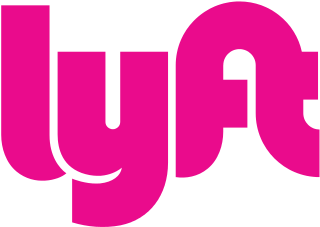
Uber Technologies, Inc., commonly referred to as Uber, is an American multinational transportation company that provides ride-hailing services, courier services, food delivery, and freight transport. It is headquartered in San Francisco, California, and operates in approximately 70 countries and 10,500 cities worldwide. It is the largest ridesharing company worldwide with over 150 million monthly active users and 6 million active drivers and couriers. It facilitates an average of 28 million trips per day and has facilitated 47 billion trips since its inception in 2010. In 2023, the company had a take rate of 28.7% for mobility services and 18.3% for food delivery.

Salesforce, Inc. is an American cloud-based software company headquartered in San Francisco, California. It provides customer relationship management (CRM) software and applications focused on sales, customer service, marketing automation, e-commerce, analytics, and application development.

Lyft, Inc. is an American company offering mobility as a service, ride-hailing, vehicles for hire, motorized scooters, a bicycle-sharing system, rental cars, and food delivery in the United States and select cities in Canada. Lyft sets fares, which vary using a dynamic pricing model based on local supply and demand at the time of the booking and are quoted to the customer in advance, and receives a commission from each booking. Lyft is the second-largest ridesharing company in the United States after Uber.
Tableau Software, LLC is an American interactive data visualization software company focused on business intelligence. It was founded in 2003 in Mountain View, California, and is currently headquartered in Seattle, Washington. In 2019, the company was acquired by Salesforce for $15.7 billion. At the time, this was the largest acquisition by Salesforce since its foundation. It was later surpassed by Salesforce's acquisition of Slack.

Mosunmola "Mo" Abudu is a Nigerian media mogul, philanthropist, and former human resources management consultant.

Marieme Jamme is a Senegalese-born French-British businesswoman and technology activist. In 2016 she founded the iamtheCODE Foundation and served on the World Wide Web Foundation board. In 2017, Quartz Africa included Jamme in their "Quartz Africa Innovators 2017" list. In 2013 she was nominated as a Young Global Leader at the World Economic Forum. In 2017, she won the Innovation Award at the Global Goals Award as a Goalkeepers for her work in advancing the United Nations Sustainable Development Goals, curated by UNICEF and the Bill & Melinda Gates Foundation, for globally supporting girls and young women and advancing the UN's Sustainable Development Goals. That same year, she was listed as one of BBC's 100 Women.

A ridesharing company, ride-hailing service, is a company that, via websites and mobile apps, matches passengers with drivers of vehicles for hire that, unlike taxis, cannot legally be hailed from the street.

Patti Webster was an American entertainment publicist, author, and minister. As the CEO of W&W Public Relations, a company she founded in 1991, Webster represented notable recording artists, athletes, and actors, including Janet Jackson, Alicia Keys, Usher, Halle Berry, Chris Paul and Holly Robinson Peete.
Slack is a cloud-based team communication platform developed by Slack Technologies, which has been owned by Salesforce since 2020. Slack uses a freemium model. Slack is primarily offered as a business-to-business service, with its userbase being predominantly team-based businesses while its functionalities are primarily focused on business administration and communication.
sf.citi, founded in 2012, is a 501(c)6 nonprofit organization that lobbies for public policies on behalf of San Francisco's tech community. sf.citi's membership consists of the world's foremost tech companies, including Microsoft, Google, Meta, LinkedIn, Twitter, Comcast, AT&T, Verizon, Airbnb, Lyft, Uber, Cruise, and Salesforce. The organization's work falls into three primary categories: political advocacy, corporate social responsibility, and events with the broader San Francisco community.

Regina Honu, is a Ghanaian social entrepreneur, software developer and founder of Soronko Solutions, a software development company in Ghana. She opened Soronko Academy, the first coding and human-centered design school for children and young adults in West Africa. Honu has received multiple awards, including being named by CNN as one of the 12 inspirational women who rock STEM. She was also named as one of the six women making an impact in Tech in Africa and one of the ten female entrepreneurs to watch in emerging economies.

Rebecca Enonchong is a Cameroonian technology entrepreneur and also the founder and CEO of AppsTech. She is best known for her work promoting technology in Africa.
The legality of ridesharing companies by jurisdiction varies; in some areas they are considered to be illegal taxi operations, while in other areas, they are subject to regulations that can include requirements for driver background checks, fares, caps on the number of drivers in an area, insurance, licensing, and minimum wage.

Kimberly Bryant is an American electrical engineer who worked in the biotechnology field at Genentech, Novartis Vaccines, Diagnostics, and Merck. In 2011, Bryant founded Black Girls Code, a nonprofit organization that focuses on providing technology and computer programming education to African-American girls. After founding Black Girls Code, Bryant was listed as one of the "25 Most Influential African-Americans In Technology" by Business Insider.
This is a timeline of Uber, which offers a variety of transportation and logistics services and is an early example of the rise of the sharing economy.
Serverless computing is a cloud computing execution model in which the cloud provider allocates machine resources on demand, taking care of the servers on behalf of their customers. "Serverless" is a misnomer in the sense that servers are still used by cloud service providers to execute code for developers. However, developers of serverless applications are not concerned with capacity planning, configuration, management, maintenance, fault tolerance, or scaling of containers, virtual machines, or physical servers. When an app is not in use, there are no computing resources allocated to the app. Pricing is based on the actual amount of resources consumed by an application. It can be a form of utility computing.

Girls in Tech was a global non-profit organization focused on the engagement, education, and empowerment of women in technology. Founded in 2007 by Adriana Gascoigne, the organization had grown from San Francisco to more than 50 chapters located in North America, Europe, Asia, The Middle East, Africa, and South America. On July 8, 2024 the CEO announced they would be closing due to lack of funding. It had 130,000 members across 38 countries.
Kaya Thomas is an American app developer. She is the creator of We Read Too, an iOS app that helps readers discover books for and by people of color. Thomas is a volunteer mentor with Black Girls Code and a Made with Code role model. She has received recognition for her work to improve diversity in the tech industry and was honored in 2015 by Michelle Obama at BET's Black Girls Rock! award show and was named one of Glamour's 2016 College Women of the Year.

Proposition 22 was a ballot initiative in California that became law after the November 2020 state election, passing with 59% of the vote and granting app-based transportation and delivery companies an exception to Assembly Bill 5 by classifying their drivers as "independent contractors", rather than "employees". The law exempts employers from providing the full suite of mandated employee benefits while instead giving drivers new protections:
Checkmarx is an enterprise application security company headquartered in Atlanta, Georgia in the United States.













